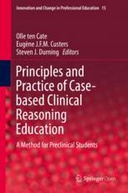Explore

Principles and Practice of Case-based Clinical Reasoning Education : A Method for Preclinical Students
This volume describes and explains the educational method of Case-Based Clinical Reasoning (CBCR) used successfully in medical schools to prepare students to think like doctors before they enter the clinical arena and become engaged in patient care. Although this approach poses the paradoxical problem of a lack of clinical experience that is so essential for building proficiency in clinical reasoning, CBCR is built on the premise that solving clinical problems involves the ability to reason about disease processes. This requires knowledge of anatomy and the working and pathology of organ systems, as well as the ability to regard patient problems as patterns and compare them with instances of illness scripts of patients the clinician has seen in the past and stored in memory. CBCR stimulates the development of early, rudimentary illness scripts through elaboration and systematic discussion of the courses of action from the initial presentation of the patient to the final steps of clinical management.
The book combines general backgrounds of clinical reasoning education and assessment with a detailed elaboration of the CBCR method for application in any medical curriculum, either as a mandatory or as an elective course. It consists of three parts: a general introduction to clinical reasoning education, application of the CBCR method, and cases that can used by educators to try out this method.
This book is included in DOAB.
Why read this book? Have your say.
You must be logged in to comment.

